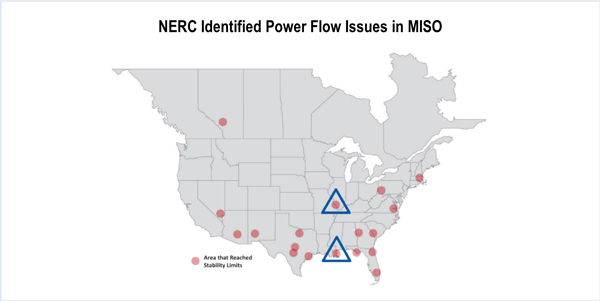By Amanda Durish Cook
MISO on Wednesday challenged a 2017 NERC assessment that found two areas in the RTO would “experience transmission challenges during an extreme event” involving a disruption of natural gas delivery.
Late last year, NERC released the results of an assessment that studied 24 “geographic clusters” that contain more than 2,000 MW of gas-fired generation and said 18 of them “demonstrated the need for additional follow-up and analysis, based on power flow and stability issues” of the “extreme cases” it ran. (See NERC: Natural Gas Dependence Alters Reliability Planning.)
“Most of the risks were on the East Coast or in the Southwest, but there were two in MISO,” Senior Policy Studies Engineer Jordan Bakke said, referring to an area on the Missouri-Illinois border and the Amite South load pocket in southeast Louisiana.
MISO told the April 18 Planning Advisory Committee meeting that those two areas have access to alternative fuel sources and are not at risk of N-1 contingencies.
“We think the method employed in this study was not the most optimal. … These risks that were found are not necessarily reasonable in MISO,” Bakke said. “MISO has assessed the two regions and found that they were not single-source … issues, and do not account for a generator’s ability to procure fuel from an alternate pipeline connection.”
Bakke said MISO, which has discussed the study results with NERC, will proceed with its own usual natural gas analyses, though it plans to add a feature to verify that dual-fuel units can access their second source of fuel. By November, MISO also plans to release results of an in-progress study on the impact that large gas pipeline contingencies may have on its system. (See “Sign-of-the-Times Studies,” MISO in 2018: Storage, Software, Settlements and Studies.)
MISO said it has been studying natural gas disruptions as part of its reliability planning since 2015 and currently uses 31 gas contingencies to evaluate “transmission needs and system risk.” MISO has repeatedly reported that only one planning scenario — the long-term loss of the largest natural gas pipeline for the entire summer peak season —would “slightly” elevate a regional loss-of-load risk.
Minnesota Public Utilities Commissioner Matt Schuerger asked if NERC’s assessment or MISO analyses had any merit when considering the natural gas generation outages during the extreme cold that hit the RTO in January. MISO staff said virtually all the gas generation outages involved generators with interruptible transportation, and little of the generation experiencing outages had back-up fuel plans.





